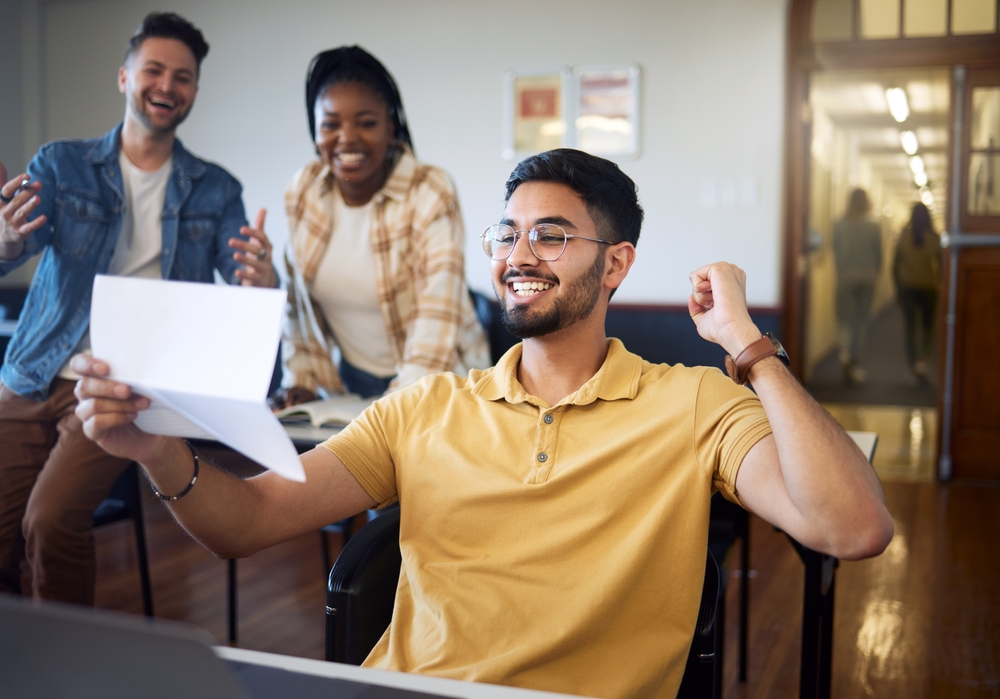Partner Up! brought an increase in the mathematics pass rate at IPO
5 March 2024
Two enthusiastic teachers work with a small group of motivated students to develop better education.

Two enthusiastic teachers, Sophia de Jong and Sylvia Riteco, work with a small group of motivated students in the Industrial Product Design programme to develop better education. It is one of the pilots within the Partner Up! project. Sophia: “Our partnership is still in its infancy, but it has already contributed to an increase in the pass rate for mathematics from 20 to 55 percent.” A conversation about the project with the key question: how can everyone who wants to, participate in education and experience that their input matters?
Partnership is the key word in every Partner Up! project. Sylvia: “Of course students can have their say in participation. They raise a problem, which must then be resolved by the educational team involved. That is quite different from a partnership. In case of a partnership you sit down together to see what could be improved. You discuss the solutions with each other and work on them together.”
For the IPO programme, the increase in the pass rate for mathematics within one year is a great first success. Sophia: “But we are far from there yet. Last year we received a lot of feedback from students. We want to set more goals together in the new year and make ourselves more visible to teachers and students.”
More support needed
Sophia de Jong is a mathematics teacher at IPO and other TIS programmes. Since February 2022 she has been involved in the Partner Up! project. “The mathematics curriculum at IPO was not going well. It was a stumbling block. My first goal was to improve this together with students. That worked out nicely.”
Sylvia Riteco is an industrial designer by trade. She has now worked as a teacher at IPO for four years, most of which in the project continuum. “That is the core of the programme, where all theoretical subjects and design skills and methodology come together. I use my practical experience to help students become designers.” Since September 2022, Sylvia has been involved with Partner Up! “Sophia and I would like to create more support among teachers and students for this project within IPO and use it to improve the project continuum.”
Valuable conversations
When you give students space in a partnership to further develop a subject together, it requires trust in each other. Sophia: “I know there are colleagues who find it difficult to give students that space. I actually experience the conversations with students as very valuable. When it came to the pass rate, I was able to ask them a lot of questions and I received feedback that I could use a lot. Together we came up with a new format for the test. Gradually it became what it is today. Other things have also changed in the same way. For example, the seminars are now run by student assistants.”
We are all winners if we have a good flow and happy students who enjoy coming to class
Inspiring ideas
Sylvia adds: “The students hold a mirror up to you. Two always know more than one. If you are open to it and start a conversation with them, you will get many new, inspiring ideas. The students really appreciate it when they experience that their input actually matters. This is also the case in a design process. Students may not have the background that you have as a teacher. But from their perspective they contribute very valuable things. And together you create something better. As a design team you are simply stronger if you involve students.”
As a collective
Every other week Sophia and Sylvia sit down with a group of motivated students. That's just the beginning, they realise. Sophia: “You cannot achieve the transition to 'building better education together' by meeting with students for an hour every other week. Universities and colleges abroad have been working on this for ten to fifteen years. Then you see that such a change is possible and has results. So we are at the beginning, but we certainly want to get to a situation in which we, as a collective, start building better education.”
Embed in programme
How can that partnership grow? Sylvia: “I would like it if we embedded it in the educational programme, so that students and teachers are given the opportunity to think about and influence education every year. I would also like it if the change to 'together' comes down to annual teams and is no longer so teacher-dependent.”
Education is very dynamic. Just like the students and society, it changes with time. Sophia: “To me it is therefore logical that – if you want to change something – you ask the students how they would do it.” Sylvia: “Of course, because as long as the education suits them, their motivation is high and with that also the chance of success and the efficiency. We are all winners if we have good flow and happy students who enjoy coming to class.”de doorstroom hebben en blije studenten die graag in de les komen.”